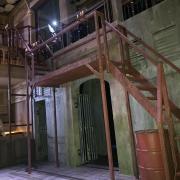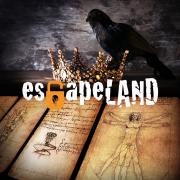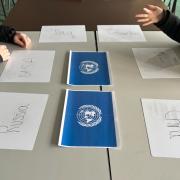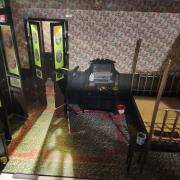
The use of the animalistic language shows how the men have no control over their anger and they are not able to control their urges. "You Men! You Beast!” shows us that the Prince is angry by the violence and irritated by their behaviour. The juxtaposition of ‘men’ and ‘beasts’ shows us that they are unable to hold back their carnivorous behaviour and how drastically the citizens go from talking and being normal to public fighting. It is like they have two personalities and they can change between them very quickly and the use of zoomorphism shows us that they can go from being humans to animals and. Furthermore, the phrase "Bloody hands” shows that nobody is innocent, and the citizens have blood on their hands. This can link to the parallel between the humans and animals and when an animal makes a kill but also ‘Bloody hands can show that all of the citizens are guilty of something. This shows us the lack of morality in the citizens and how these brawls are unstoppable as they are unable to control themselves.
Moreover, nobody wants the peace and due to the fact, everyone is engaging in the brawl tells us that they want bloodshed and they enjoy the violence and part of them enjoys acting like animal. The quotation “Pain of torture” and “Enemies to peace” shows us the citizens don’t want peace and in fact hate the idea of it as they enemies of the concept of peace and they use violence to get across this. Also, the fact that the citizens must engage and be part of this brawl show that they have a need for this bloodthirsty and violence; a part of them enjoys the fight and letting themselves act like animals. The irony in this, is the fact that the prince addresses the situation as if they were forced to take part but, they were in full control and wanted to be part of this bloodshed. This shown when Shakespeare writes “And made Verona’s ancient citizens. Cast by their grave-beseeming ornaments, to wield old partisans in hands as old,” This is written as if the other citizens were ‘made’ to fight which is not the case. This is circling back to the idea that as nobody, other than the Prince wants to stop this fight and instead everyone wants to take part, this is emphasizing on the fact that the violence is irrepressible.
Shakespeare presents the citizens of Verona as one civic body. "With purple fountains issuing from your veins,” the use of the colour imagery ‘purple’ links to the idea of power and royalty this idea is shown throughout the play as you can see the difference in class between characters such as the Nurse and Juliet throughout the play. Furthermore, the colour purple is an aristocratic colour and the colour are a combination of the primary colours, red and blue. The colour red can be associated with Montague and specifically Romeo. Romeo is very passionate and falls in love easily. Red can be used to represents Romeo because he is a risk taker, he is bold in relationships, and is a dynamic animated communicator as well as the fact he easily falls in love and is associated with love all throughout this play. Romeo acts very bold in relationships, one of the traits that falls under the colour red. In Act 2 Scene 2, on the night that Romeo met Juliet, he climbed up her balcony and confessed his deep love for her this was a very bold thing for Romeo to say and do and an example of why he is associated with red and the quote “my heart’d dear love is set” this how that Romeo thinks through from his heart and is driven by his love by Juliet . Juliet is normally associated with the colour gold and blue to represent her logical personality shown in act 1 scene 3 where she talks to her mother about marriage; the quote “Marriage, it is an honour that I dream not of” shows that she is clever by not rejected the idea but carefully using her words to get her point across. Juliet values rules, makes and keeps commitments, and often makes decisions based on her feelings. Therefore, using the colour ‘Purple’ could represent the mixture of these two houses whether it be through them fighting or through Romeo and Juliet's love. Also, the connotations of the ‘fountain’ links to the idea of overflow of violence and the use of the possessive nouns in the passage, such as ‘mine’ and ‘your’ in reference to the citizens and this could show that the damage and the brawls were self-inflicted. On the other hand, you could also interpret it as linking to the idea of eternity as fountains are water has symbolized a never-ending path or endless time this could show that Romeo and Juliet's love is eternal. This emphasis the fact that maybe the violence is spawn from love and loyalty and this idea challenges the idea of violence and hate.
Another way the theme of violence in the play through the toxic masculinity and the male code of honour and their need to assert dominance. The play opens with phallic imagery and rape jokes between Sampson and Gregory in the streets of Verona. These two characters begin by quipping back and forth about their frustration with the Capulets, but their conversation becomes increasingly violent and increasingly sexually charged. “I will push Montague’s men from the wall and thrust his maids to the wall "and “I will be cruel with the maids and cut off their heads…the heads of the maids, or their maidenheads". Both statements make women an instrument of male dominance and the victim of sexual violence, but the second one goes so far as to conflate sexuality with violence and to make the act of murder and rape on in the same. Violence is used indirectly in this part rather than fighting they are using language and showing violence through rape of a women. This act shows their way of using violence against women in a way to assert dominance over the other family, but also a way of proving his own masculinity. Furthermore, when this physical violence erupts the heads of the Montague and Capulet families attempt to enter the fray not despite their age, but because of them trying to show that they were the strongest house. When Capulet asks for his sword his wife replies “A crutch, a crutch! why call you for a sword?” the sword is his crutch. This shows that he leans on violence to uphold an image of traditional masculinity and so, even though the reason for the fight has been forgotten, the families must continue fighting. Any legitimate dispute has long since been replaced by a meaningless feud, in which two aging men continue to act out antiquated notions of strength, dominance, and how real men ought to behave during that era. This language was very normal in this time period as women were seen as weak beings and normally seen as objects rather than people and men use to take advantage of this and use them to keep their male pride and show the community that they were strong and dominant.


























